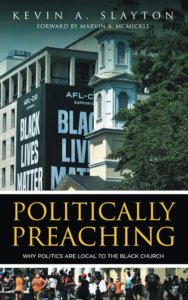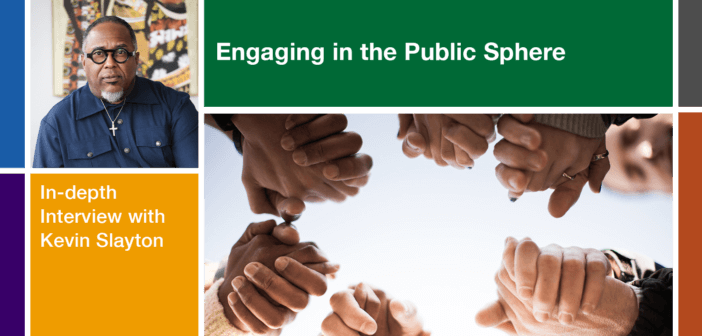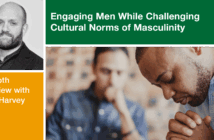How can church leaders better engage the public sphere and expand their prophetic witness? Kevin Slayton, a pastor with a passion for public policy and prophetic preaching, reflects on building relationships, engaging in politics, and his book Politically Preaching, Why Politics Are Local to the Black Church.
Watch the interview video on YouTube, listen to this interview, or continue reading.
Jessica Anschutz: In the introduction to your book, you focus on “the need for prophetic preaching and the public square and its potential impact on those living in the shadows of poor policies and tainted governments.” Share with our listeners why this work is important for you.
Kevin Slayton: It’s always been important. More so now than ever, there seems to be not just a complicit pulpit at work, but one that’s almost absent. In many ways those issues that often impacted the poor have been hijacked by many on the right. In many ways the day-to-day concerns of people who live on the margins have been ignored. Those on the right seem to be concerned about the wealthy, and those on the left seem to be concerned about those in the middle class. The scripture tends to spend most of its time focusing on those who are poor, and I’m concerned that the prophetic voice has taken a time out. As a result, folks from all backgrounds, races, genders, and ideologies, are suffering because our public policies are not reflecting the everyday concerns of people.
Jessica Anschutz: Kevin, in the book, you note that the public sphere is “the most ideal place for engagement and conversation for those who would seek a societal common good.” How can church leaders better engage the public sphere?
Kevin Slayton: The first place to start is to become a part of the community.
I have found working in public administration as a faith-based liaison on the mayor’s office that some faith communities don’t know where to enter the conversation. Sometimes issues that are local matters are being addressed at a state level, or even at a federal level, and people raising the issues do not recognize that those offices cannot do anything to address the issue on the local level.
Another way to engage is to make yourself aware of the political systems that surround your faith institution at the local level. This means developing an understanding of how local government works, what it can and cannot do, and what your expectations are and what it is you want to receive. I would suggest getting knowledge of the political landscape that surrounds your faith community. If you’re pastoring a church, and you don’t know who your representatives are, then you’re already working from a deficit.
Jessica Anschutz: So once a pastor or other church leader identifies who those folks are, what’s the next step?
Kevin Slayton: Next is getting a sense of what the issue is. Then, if it’s an issue related to health care, then you need to know who’s working with the health department. If it’s an issue of housing, you need to connect with the director of housing or the person in the administration dealing with the issues of homelessness. There’s no substitute for being prepared and understanding what it is you want to particularly address. In many ways, I think folks have accepted that the voice of the faith community will be given instructions. You get the call, “Hey, we need people from the faith community to show up on this issue,” and we show up because we’re glad to be invited, but we really have very little knowledge of the issue at hand, or its overall ultimate impact on the people that we serve. So, there’s no substitute for that.
Jessica Anschutz: How can the faith community better equip themselves to get that information about the issue? What should they be doing?
Kevin Slayton: Using a scriptural reference of Moses: look at what’s in your hand. Look at your congregation and see what gifts, skills, talents, networks, and connections are in your pews. You may be very surprised at who has access or who’s working on these issues. Very few churches have a social action or social justice ministry, so they fly by the seat of their pants as issues come by; but having a prepared group of people working within your congregation to address those issues is a great place to start. The pastor cannot do everything, can’t be all to everybody, so having a team in place is important. There are people in our congregations who have these skills and gifts. They’re waiting to be asked how to use them. So, develop that ministry within your church and see where it leads.
Jessica Anschutz: I hear you saying that are two aspects to this work. One is getting to know the community, and the other is getting to know the community within the congregation or the context of the church. Then identify what the needs are and what the gifts are and discern how God is calling you to respond.
Kevin Slayton: I think it’s okay for folks to know you don’t always have to respond especially if you don’t understand what’s at stake. It’s okay to say, “Can we get back to you?”
Jessica Anschutz: When they’re called upon, people tend to want to respond right away. They don’t always do their homework to get all the information about the issue or whatever they’ve been approached to speak about. In thinking about this as a pastor who has been politically engaged, if you are asked to speak to the media on a particular subject or topic, what are some of the things that you do to prepare yourself for those conversations?
Kevin Slayton: It’s like preparing for a sermon. If you’re preaching John 3:16, you ought to read at least John 3:15 and John 3:17. So I try and get a sense of the discussion that’s been going on around the issues, to identify some of the key players and the stakeholders—in particular who’s in opposition and who’s in support. Then depending on the way in which we want to fall, reach out to some of those people to get a sense of what’s been said, what’s been the action, what’s are the motivations. Then after being armed with that information, take the theological authority. The request for your voice and your input is because they’re seeking a theologian’s perspective.
So, take that information, pray, and get a sense of the direction in which you want to speak. Most often you will lift a moral or ethical argument because the more tangible elements of the issue have been raised by other stakeholders in the discussion. So, get a grasp of what that is, and then figure out what messaging should come from that theological voice, and assess if there is an action that needs to be involved. Again, work with folks within your ministry, folks that you partner with in community and faith, to develop what that message and what that action will look like. All those things make for a much more effective introduction into the foray of whatever the issue is.
Jessica Anschutz: Kevin, you referenced the importance of relationships. What words of wisdom do you have for church leaders for building and strengthening relationships within their community?
Kevin Slayton: The first word that comes to mind is authenticity. You don’t have to try and be something that you aren’t in the community. One of the hard things to do is to try and show up on the scene when you’ve been absent so long and assume that you have the authority over the people who have been doing the work. We’ve seen that happen with different actions taken throughout the country, whether in Chicago or Baltimore. Often when things happen, the faith community wants to rush to the front of the line, and they forget that there have been people on the ground working on these issues for quite a while.
There are people who’ve been working on the issue who are not affiliated with any religious group. So, they don’t have appreciation for your collar or whatever it is you think you bring to the party. It’s best to enter naturally—find out who the people are, let them get to know you who you are, and let them lead you.
Now, if you’re leading the effort, your standing in the order is different. In most cases, working with the community is not something that happens inorganically. You should have been involved from some perspective so that they will at least reach out to you. I find that clergy who are known for that type of community work, tend to be the “go to.” I’ve worked on issues, and I’ve had folks say “well, who is he? Why are we listening to him? Why is he doing that?” It’s always affirming to have someone else within the coalition or the body of folks involved to stand up and say “that’s Reverend so-and-so. He’s done this. He’s done that,” and they can authenticate you to the people that you’re working with.
Show up and create an authentic relationship. Begin to build that trust with the folks that you’re working with. They can trust that if the discussions go one way and leadership says, “We want to take a meeting, but we only want to meet with two or three of you. We want to meet with Reverend so-and-so, blah, blah, blah.” I’ve had that incident happen. They’re like, “we’ve been here for two years working on this issue. Why aren’t they working with us?” Oftentimes you need someone on the inside to give some validation to who this person is or that’s why that is.
If you haven’t had that relationship, now is the time to start building. Attend community association meetings, make sure there’s one on your calendar, at least for the ones around you. Host some events, make your space available at least once a quarter or once a year to feed the community association. Let them have their meeting in your space, and then they make the connection with you. Going in cold when they have no idea who you are can be disastrous.
Jessica Anschutz: I can see how that could be disastrous, not only in this context, but in many contexts in ministry. The importance of leading authentically out of who we are and who God is calling us to be. In the book, you talk about how all politics are local to the church. I invite you to share with our listeners what you mean by this.
Kevin Slayton: I say all politics are local to the Black church. I take that lead because post the assassination of Dr. King, there has been a sort of parade during the election cycles where candidates make frequent campaign stops in predominantly African American Protestant churches in a way that you don’t see visits to mosques, synagogues, or temples. There’s an expectation that within this group is a voice that comes from the pulpit that directs the congregation in which way they should be looking politically. All politics are local. No one comes to a local community and takes on a leadership role or any role without some validation from someone on the inside.
Jessica Anschutz: Some pastors have been reluctant to engage in politics because they’re worried about jeopardizing the nonprofit status of the church. How can pastors be politically engaged without jeopardizing that status?
Kevin Slayton: Once you get to 1996 and the creation of “Charitable Choice” language, it creates the legal standing to unblur the separation of church and state, which is what most faith organizations try and avoid. The statement that I just made shows the significance of that legislation and that language. Prior to 1996, churches were referred to as churches, mosques were referred to as mosques, temples as temples, synagogues as synagogues. Once you have “charitable choice” language, we become referenced as faith-based institutions and now, faith-based institutions can engage in government sanctioned entities, and receive a financial benefit of this relationship, as long as they agree to do two things. One, not to proselytize, not to try and recruit someone to their faith. Two, not to discriminate against others as it relates to the resources they’ve received. So, if you’re a church and you get grant money to build a daycare, you can’t discriminate against someone who wants to work in the daycare at the church because they’re a Muslim. That is most critical.
But I also think this sort of muted the prophetic voice of those in the faith community as well. Folks are not as inclined to stand up against visible injustices because they do not want to cross the boundary. We live in a day and time where faith institutions want to be on the good side of empire. They know other churches seem to benefit from having those good relationships. As the late Cain Hope Felder would say, we don’t “trouble the waters” anymore for fear of being penalized. Rarely are churches sort of called to the mat on these issues or infractions unless it deals with finances. When it comes to political engagement, everyone knows the churches are not allowed to endorse campaigns, et cetera. I facetiously say in the book, that historically within the Black church it’s common for politicians to come to church. If you’ve ever been to a Black church, you’ll hear the preacher say, “I can’t tell you who to vote for, but I can tell you who I’m voting for.” They’ve found ways to bypass that. Most of those sanctions that folks are trying to avoid, or that they do run up against, tend to do with the improper use of finances.
Jessica Anschutz: I appreciated that you named that too many preachers are concerned with what elected officials think of them rather than what God thinks of them. As a pastor yourself, how do you stay connected with God’s will for you?
Kevin Slayton: As I’m getting older, it’s not so much about me but it’s about what God would have me to do in this situation. When I’m true to that, I tend to just try and do what I discern the Lord has said through prayer and through my own conscious and put aside personal and emotional concerns.
Jessica Anschutz: We have been talking about Politically Preaching: Why Politics are Local to the Black Church by Kevin Slayton. I want to thank you not only for your time with us today, but for the ways in which your faith and witness are speaking out for those who are marginalized and oppressed. As we close our time together today, I invite you to share words of encouragement for church leaders who are thinking about taking the next step to engage in local politics.
Kevin Slayton: You should be willing to commit yourselves to the three S’s: If you see something, say something, but be very sure of your faith and your confidence. Because the final S may require that you suffer something. Most people in our work have chosen not to say anything about what they see because they’re not willing to suffer. I think a part of our calling is to suffer. Ministry is dirty work. From the time that God deals with man by putting his hand in the dirt and the dust, it became evident that ministry would be somewhat dirty. So be prepared to suffer. I don’t know how much further our nation, or our society will make it, if those who have been called to stand in the gap and to preach and to speak about justice are resigned to the sidelines because they’re afraid to suffer, I think we are in trouble.
Jessica Anschutz: Thank you for that prophetic word and thank you for your time today.
Kevin Slayton: Thank you.
 Politically Preaching: Why Politics Are Local to the Black Church by Kevin Slayton is available at Amazon.
Politically Preaching: Why Politics Are Local to the Black Church by Kevin Slayton is available at Amazon.
Related Resources
- Pastor as Community Activist featuring Heber Brown, III—Leading Ideas Talks podcast episode | Podcast transcript
- Martin Luther King Jr.’s 4 Key Principles of Prophetic Witness by Tony Hunt
- Leading in an Age of Political Polarization by David R. Brubaker
Photo by Pearl on Lightstock







